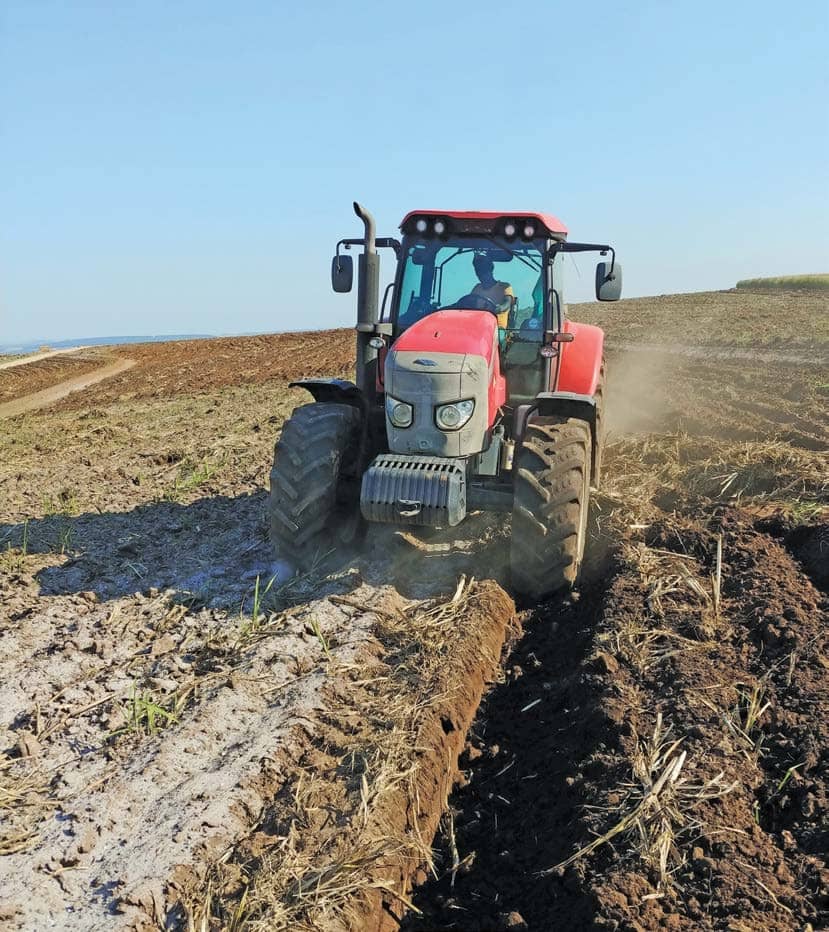Prøve GULL - Gratis
Shifting paradigms to make SA sugar cane farming more sustainable
Farmer's Weekly
|December 13, 2019
The negative effects of more than 170 years of monocropping with sugar cane in South Africa are starting to appear. KwaZuluNatal sugar cane farmer Deon Schröder explains what these are, why they should be changed, and how he is going about this on his farm.

Sugar cane (Saccharum officinarum) is a perennial crop that can be harvested a number of times once first growth and regrowth have reached maturity.
Deon Schröder, who farms in KwaZulu-Natal’s Dalton area, grows 600ha of dryland sugar cane, of which about 55% is harvested in an 18to 24-month rotation.
“We get roughly five harvests from a field, which means we plough out and replant a field every 10 years,” he says.
“Traditionally, a field would lie fallow for three to six months between ploughing out and replanting. Like many other South African sugar cane growers, I struggle with an increase in soil acidity over the life of a field. Even though sugar cane can tolerate soil acidity to some degree, it’s commonly a severely limiting factor, resulting in serious yield losses.”

SOIL ACIDITY
South Africa’s sugar cane farmers typically deal with increased soil acidity by applying lime or gypsum to the surface of a fallow land immediately after a crop plough-out.
According to Schröder, most sugar cane farmers aim to keep their lands totally free of weeds, using herbicides as well as hoes.
In addition, they use chemical fertilisers to boost growth. Based on soil test results, a fertiliser mix is applied at a rate of about 120kg/ha nitrogen (N), 20kg/ ha phosphorus (P) and 200kg/ha potassium (K). Ratoon crops are given the same mix, but a slightly higher rate of N – between 140kg/ha and 180kg/ha.
“When a field is ready for harvesting, we burn it to remove as much leafy material as possible from the standing stalks to make harvesting and processing easier,” says Schröder.
Denne historien er fra December 13, 2019-utgaven av Farmer's Weekly.
Abonner på Magzter GOLD for å få tilgang til tusenvis av kuraterte premiumhistorier og over 9000 magasiner og aviser.
Allerede abonnent? Logg på
FLERE HISTORIER FRA Farmer's Weekly

Farmer's Weekly
South Africa's unique coral trees
Every year in late winter, South Africa's eastern coastal belt is set ablaze with the scarlet and orange flowers of certain coral tree species from the genus Erythrina. Mike Burgess investigates the diversity of this special category of highly adaptive deciduous trees that includes the peculiar ploughbreaker.
2 mins
November 7-14, 2025

Farmer's Weekly
Jaecoo J5 is ready to make waves
Chinese carmakers have been growing their local market share at the rate of knots over the last few years. The introduction of the Jaecoo J5 will further ensure the upward curve
2 mins
November 7-14, 2025

Farmer's Weekly
Farm watches take charge of rural safety
With rural crime on the rise and police resources stretched thin, farm watches across South Africa are stepping up to protect farming communities. These volunteer-led safety networks are preventing millions in losses, deterring criminal activity and helping police solve major crimes, proving that when farmers unite, the benefits ripple far beyond the farm gate.
8 mins
November 7-14, 2025

Farmer's Weekly
How to start a farm watch in your area
Rural safety initiatives like farm watch systems are guided by the framework laid out in the national Rural Safety Strategy. Dr Jane Buys, safety risk analyst for Free State Agriculture, talks Sabrina Dean through the concept of a farm watch and how to establish one
9 mins
November 7-14, 2025

Farmer's Weekly
'Farm attacks are a national crisis'
The rural safety crisis in South Africa remains dire, with farm attacks and murders continuing at alarming rates. This calls for rural crimes to be declared priority crimes as a matter of urgency, according to
3 mins
November 7-14, 2025

Farmer's Weekly
Advancing real-time data collection in South African agriculture
Dr Mahlane Godfrey Kgatle, Research Coordination Manager at Grain South Africa, spoke to Octavia Avesca Spandiel about how the Information Hub at Innovation Africa, University of Pretoria, is transforming agricultural research through real-time data integration and collaboration across disciplines.
3 mins
November 7-14, 2025

Farmer's Weekly
Stellenbosch in November: a seasonal gem and the perfect time to visit
Brian Berkman suggests you clear your diary to spend more time in November in the beautiful Eikestad.
3 mins
November 7-14, 2025
Farmer's Weekly
Adapting to the Climate Change Act: how agro-processing SMEs can build resilience
Wynand Deyzel, commercial sales manager at Solenco, spoke to Octavia Avesca Spandiel about how the Act is shaping the operational durability of small to medium-sized agricultural enterprises and the role of indoor air management in adapting to climate impacts.
3 mins
November 7-14, 2025

Farmer's Weekly
KWV shines at Veritas Awards with top accolades
KWV made history at the 35th Veritas Awards when it clinched the prestigious Duimpie Bayly Vertex Trophy – the award for the best wine in the show, excluding Museum Class Wine – for the second year in a row and third time overall.
2 mins
November 7-14, 2025
Farmer's Weekly
Co-operation needed to build a resilient food system
From governments and international organisations to farmers, researchers, businesses, and consumers, including the youth, everyone has a role to play in shaping the transformation of agrifood systems of the world
2 mins
November 7-14, 2025
Translate
Change font size
